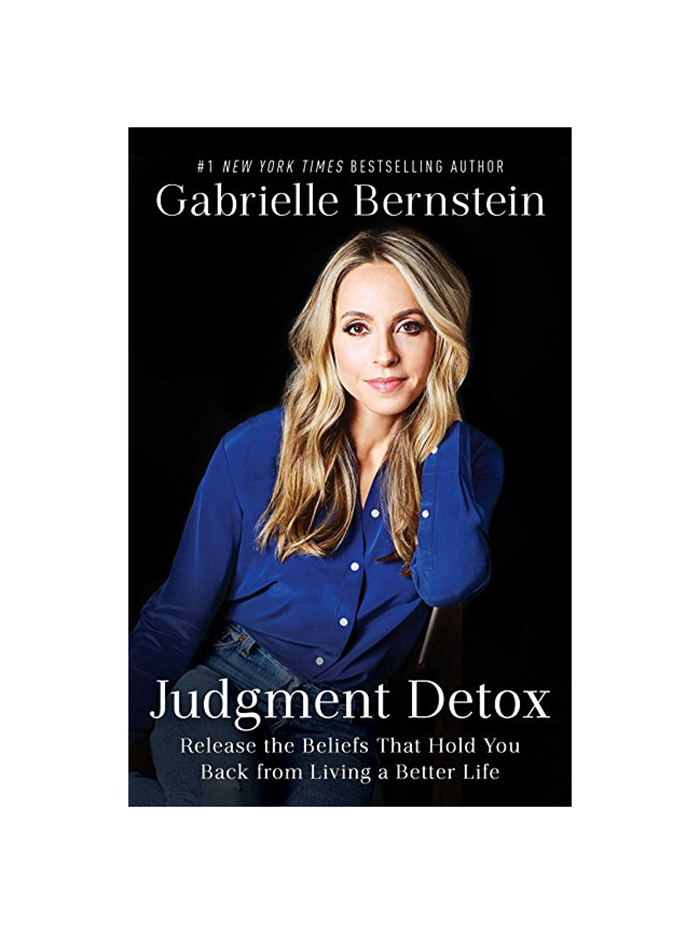Do You Need a Judgment Detox?

Internet trolls. Polarizing comments on Facebook. The woman moving too slowly in line. Feeling annoyed after leaving brunch with your girlfriends. When your partner doesn’t respond the way you want him or her to. According to celebrity life coach Gabby Bernstein, we’re always judging each other.
In her latest book, Judgment Detox ($17), she opens by sharing an admission I can relate to: We’re all pretty damn judgmental these days.
“I struggle with judgment every day,” Bernstein writes. “I judge far and I judge wide.” After chatting with her via phone about this topic, I learned it took her four to five months of self-work to come out on the other side feeling judgment-free, happier, and primed with the tools to help her (and you!) deal with judgment on a daily basis.
To clarify, judgment is a cycle, according to Bernstein. Often, it is a projection of our own pain and insecurities. We feel judged, so we judge back. No one in that orbit is at peace, and it’s up to each of us to get off of the toxic merry-go-round.
“To break any pattern, you have to replace it with a new one,” Bernstein says. “The book is effective because it gives you a new pattern and changes your perception.”
To do this, she maps out a six-step plan to success, which combines enlightened self-awareness, journaling, meditating, and more to help you release your judgments. The spirit guru believes the only antidote to judgment is love. While it might seem new age-y, it might also be the only thing can get us out of these negative judgment cycles. And if the journey leads to a friendlier social life and a clearer head, isn’t it worth it?
Below Bernstein reveals how to open your heart and literally love people instead of judging them.
What is the biggest misconception about judgment?
“That it’s okay. A lot of people justify their judgment because they think it’s something they do socially. ‘Everybody does it. Why can’t I?’ It’s a very detrimental habit. The biggest misconception is that it’s not a big deal, but it is.”
What is judgment?
“I define judgment as a separation from oneness, from the truth of who we are—which is kindness, compassion, and love. Judgment is a place of separateness, littleness, and attack. The separation from love is the simplest way I would describe it.”
How can someone identify that they are being judgmental?
“We have to be willing to witness our judgment. You’re not going to look at your judgment unless you want to change. If you notice that you’re not feeling connected or good, then you want to start your first step in the book, which is: Witness your judgment without judgment.
“If you notice yourself at brunch with your girlfriends and you leave feeling exhausted, not happy, and a little depressed, you might want to ask yourself, ‘how judgmental have I been?’ The energy of judgment is a really low vibe. So it will bring you down pretty quickly. When you notice yourself in that lower vibrational energy, start to be conscious of what or who have I been judging?”
How is love the antidote to judgment?
“When we choose to perceive someone through compassion or forgiveness, we’re leaning toward our loving mindset. When we’re in a loving thought, we can’t be judging at the same time. Judgment and love can’t coexist.”
What's so addictive about judgment?
“It’s a cycle. You feel disconnected, so you judge to project out what you don’t want to feel within. And then you feel guilty because you’ve been judging someone else. Then you don’t like the pain of judging yourself. It’s an addictive pattern that cycles and never ends.
“Gossip is another form of judgment. It’s another way that judgment manifests—it’s through gossip. We use gossip as a way of feeling a temporary reprieve and a temporary, false connection to others. So that connection, while it feels good for a moment, isn’t real. It’s just magnified judgment.”
How can we be less judgmental on social media?
“We’re tempted to judge all day long on social. If you have a judgment, keep it to yourself and do your work to clean it up because there are people out there who are hating on social media. They’re starting a war every day. It’s violent. It’s a hate crime. I’m taking it really seriously.
“I was bullied recently on the internet, and I’m just so devastated for these kids who don’t have the resources to handle that feeling. Really check yourself before you post anything negative about anyone else—even if it’s a stranger. Even politicians. You can speak up about what you think is right, but don’t judge other people because you’re just perpetuating the overall problem.”
What's a great stop-in-the-moment tactic to help you if you're feeling judged or if you are judging someone else?
“Send a positive intention or say a prayer for the other person because the moment you can see that person in love and in light is when the judgment dissolves. That is a great way to replace the judgment with love.
“When these women were bullying me on the internet, for example, it was devastating. And I don’t write back to that stuff. I was really angry reading all of the comments. Then I thought, ‘A happy person would not engage publicly in this.’ I brought myself to the place that they’re in, to be writing these hate blogs about someone who is only doing good. But really, it’s about anyone. Who cares who it is? I took a moment to think about how they may be feeling, and I said a prayer for them. I prayed for them to feel better about themselves.”
What are some other tools that can help stop the judgment cycle?
“The meditations in the book are designed to help cut the energy cord between you and the other people you judged—or even yourself. When we are judging, we create this energetic bond between ourselves and someone else. Like those women who were judging me online—they hooked into me energetically. So this morning I did a whole cleansing meditation from the book called Cord Cutting. And I cut the cord because I wanted to release myself of their attack.
“Journaling works too. There are a lot of practices particularly when you’re looking at and taking an audit of your judgments. Ask yourself the questions in the book: What or whom am I judging? How does it make me feel? Why do I feel justified in this judgment? What experience from my past is triggering it? Those four questions are there for you to journal on so you can see the patterns in your judgments. It’s a powerful practice.”
How can we expect to feel after stopping the judgment cycle?
“It’s so much nicer! I’m much happier and I have a lot more time. I can notice when I am judging somebody else—it’s because it’s reminding me of something I don’t want to see in myself. I really take that seriously.”
Disclaimer
This article is provided for informational purposes only and is not intended to be used in the place of advice of your physician or other medical professionals. You should always consult with your doctor or healthcare provider first with any health-related questions.
